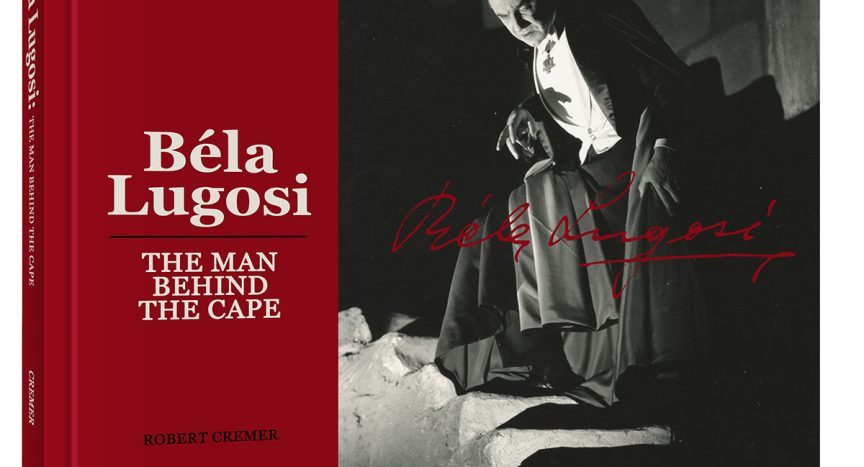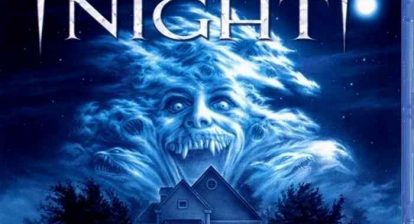Béla Lugosi: The Man Behind The Cape promises fans of the beloved actor new insights, anecdotes, perspective and more.
Béla is perhaps best known for his role in Universal’s Dracula (1931) which kicked off the Universal Monster era. He appeared in other Universal classics. He also appeared in a host of other stage and screen roles.
Written following extensive research and interviews by journalist and Lugosi expert Robert Cremer, the book features 700 photographs, including many rare or never-before-seen family photos, letters, documents and historical artifacts curated by Lynne Lugosi Sparks of the Lugosi Family Archives, many of which have never before been published.
The book, to be published by Clover Press, also features an all-new foreword by Béla Lugosi, Jr. and an afterword by noted Lugosi historian Dr. Gary Rhodes.
It’s being crowd funded via this Kickstarter.

Among the interviews conducted are those with Lillian Lugosi Donlevy, Lugosi’s wife of 20 years, plus some of the actor’s closest Hungarian relatives and friends.
From humble beginnings in Hungary, the book traces Béla’s his political activism and provides details of his transatlantic crossing to America which had harrowing moments.
The book also promises to explore reasons for Béla’s decline into B-movie productions in Gower Gulch in the 1950s. In that realm, extensive interviews with Edward D. Wood, Jr. help reveal “heretofore unknown background on Béla’s involvement in the filming of the cult classics Glen or Glenda, Bride of the Monster and Plan 9 from Outer Space.”
Cremer recently fielded a few questions from Wicked Horror and provided a few additional notes and other morsels of what to expect in the book.
WH: Béla is a magnificent screen presence, beloved among fans, but his life certainly had sad aspects and downturns. Did you find you were writing a tragedy as you tackled this project?
Robert Cremer: Fans are all too well aware of the downturns in Béla’s career, but they may not fully understand the causes for his decline. Béla’s obsession for perfection in his craft, which began as a young boy in Lugos, where he saw theater performances and began producing his own plays in a vacant warehouse near his home, paved the way for both triumph and tragedy later. The book details for the first time, precisely how Béla’s uncompromising artistic standards brought him to the pinnacle of Hollywood stardom as Count Dracula and Ygor, but later left him in Gower Gulch appearing in B-movies ‒ a man dependent on methadon and alcohol, but determined to make a comeback at the age of 70.
Although these downturns are sad indeed, Béla’s story has a moral ‒ and an inspiring one at that. He never compromised his principles in his personal life or professional career, regardless of the price. He paid a dear price more than once for his convictions. These are all highlighted in the book through exclusive interviews with those who experienced these downturns with him. For example, he sacrificed wife, family and country to establish a trade union for actors in Hungary to prevent them from being exploited by theater and studio management. In spite of the price he paid for his commitment, he became involved in the founding of the Screen Actors Guild in Hollywood for the very same reason. He volunteered for military service in Hungary at the outbreak of WWI, although actors were exempt from the army, in order to serve his country. The price he ultimately paid for his patriotism was a dependence on drugs later due to war injuries. Later, he was forced to use drugs to alleviate severe pains from those war injuries in order not to disappoint his audiences with interruptions or cancellations of performances.
At the outset of my research, I was certain that I would be writing a tragic story about a very great actor; however, as I spent more and more time with Lillian, Béla’s wife of 20 years, his relatives and closest friends (many of whom knew him in Budapest), my sadness turned to admiration. Exclusive interviews with those who knew him intimately revealed the man behind the cape to me. His incredibly dramatic and inspiring personal story amazed me and made it clear that Béla’s story was unique in every respect.
On the note of perspective on tragedy Cremer noted Lynne Lugosi Sparks had this to say about the book: “I never met my grandfather, as he passed before I was born, so Robert Cremer’s book is for me and my siblings and our children, a history of our family’s patriarch. One of the most touching parts of this book is the honest way Bela’s life is documented to reveal successes and happy times woven into the times of hardship, times of fortitude, and a lifetime of hard work. Many consider my grandfather’s life to have been tragic, but the tragic moments do not define his entire life or career. I feel this book will illuminate readers with Béla Lugosi’s dramatic life experiences, details of his prolific professional career, and will reveal a multifaceted human being – and they will finish the book with a new appreciation for the man who was a Hollywood star and has become a cultural icon as Dracula.”
Also See: Universal Classic Monsters: The Complete 30-Film Collection is a Must Own for Classic Horror Fans [Blu-ray Review]
WH: We obviously don’t want to spoil this experience for readers delving into this work, but can you tell us something that surprised you in particular as you delved into Béla’s past?
Robert Cremer: Literally everything surprised me about him, as I conducted exclusive interviews with Béla’s wife, his relatives, his closest friends, many of whom knew him in Budapest, as well as with Dr. Nicholas Langer, who treated Béla
during his rehabilitation at Metropolitan State Hospital in Norwalk, CA. These exclusive interviews frequently corrected inaccuracies about Béla that had been repeatedly reported in the press, or revealed completely unknown information about Béla’s personal life and professional career. For example, I was amazed when I found answers to many questions, such as:
- Where Béla found his inspiration to become an actor at a very young age and what attracted him to the acting profession.
- How Béla’s labor union activism brought an end to his first marriage to Ilona Szmik.
- Why Béla feigned insanity to be released from the army during WWI after he volunteered for military service.
- How two sailors and a cat saved Béla’s life during his transatlantic crossing to the U.S.
- How Béla’s performance in the film The Raven resulted in his becoming virtually unemployed for nearly three years.
- What factors led Béla from the pinnacle as Count Dracula to B-movies in Gower Gulch.
- Why Béla inflated his dependence on drugs and alcohol from just three years to 20.
- What role fishhead stew played in the cult collaboration of Béla with Edward D. Wood, Jr.
Béla’s life was full of surprises for the simple fact that it is a story unlike that of any other Hollywood star. His dramatic experiences in life were the negative from which his stage and film roles were developed. His biography is unsurpassed in personal drama, tragedy and inspiration.
See Also: Four Essential Cinematic Adaptations of the Dracula Story
WH: Were there any interesting behind-the-scenes details on specific films that you were proud to unearth?
Robert Cremer: There were many, but one touching example concerned his role as Ygor in Son of Frankenstein (1939). This was Béla’s first role following a hiatus in horror film production that left him virtually unemployed for almost three years and reduced him and his family to poverty. Knowing that Béla was desperate for work, Universal offered Béla a pittance for his role in the film, and then instructed the director, Rowland V. Lee, to shoot Béla’s scenes in one week to minimize the cost. Lillian told me the poignant story of Lee’s intervention on Béla’s behalf. She said that Lee told her he would do everything possible to keep Béla on the set for the entire production to ensure he maximized his earnings from the film. He did this, in spite of Universal’s protests, and gave Béla the opportunity to fully develop the unique character that Ygor became in the film. His performance was lauded by the press as the finest in the film, and Béla received a salary commensurate with his contributions to the film.
See Also: Five Must See Horror Films from the ‘30s and ‘40s That Don’t Feature the Universal Monsters
WH: Did you find any interesting new details about Béla and co-stars?
Robert Cremer: I interviewed a gifted Black actor, Dr. Clarence Muse, who appeared in two films with Béla, White Zombie (1932) and Invisible Ghost (1941). During a weekend of interviews on his ranch in Paris, CA, he told me about Béla’s political activism and his crusade to support oppressed people. He noted that Béla was the only white actor he ever worked with who socialized with Black people on the set and even invited Clarence Muse to parties he threw at various Hungarian restaurants. Muse noted that he “rolled up his sleeves and socialized with everyone, regardless of color, religion or social standing, from workers to the social elite in Hollywood.” He also recalled that Béla was passionate about supporting Hungary and the U.S. during WWII, often foregoing lucrative career opportunities to devote himself to the war effort.
WH: You interviewed some important people from Béla’s life. Who were the most compelling figures you talked to?
Robert Cremer: I interviewed many producers and directors, such as Edgar Ulmer, Robert Florey, Robert Wise, Joe Pasternak, and Steve Szekely, who worked with Béla over the years, but the most compelling persons I interviewed were those who knew him as relatives and close friends, such as his nephew Béla Loósz, his closest friend and confidant Vili Szittja, and, of course his wife of 20 years, Lillian. Only these persons could help me achieve my goal of revealing the personal man behind the cape. Their private insights into Béla’s life were the driving force behind the story that unfolded.
Did You Know? Wicked Horror TV Has Classic and Independent Horror Films Available to Stream for Free!

WH: What do you hope readers of your book will take away as far as understanding Béla?
Robert Cremer: I hope that readers will gain a deeper appreciation for the remarkable qualities Béla embodied not only as an impeccable artist, but also as a passionate human being. Béla’s life story has an important message for readers, regarding his passion for perfection, his uncompromising commitment to righting injustices and his abiding activism in support of the oppressed.







